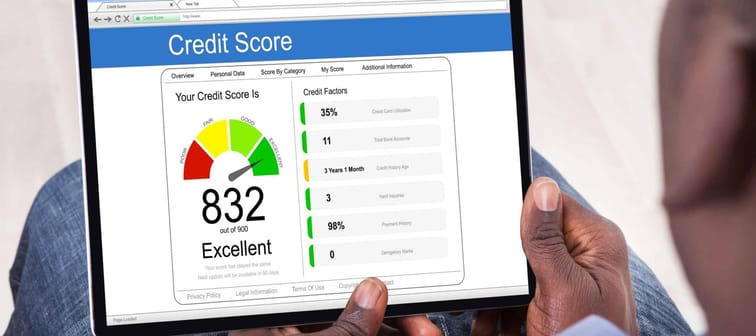How to get a free credit report
Obtaining a free credit check from Equifax and TransUnion is simple. The steps to take are covered in detail below, including phone, email, fax, and even in-person requests to both credit bureaus.
Equifax free credit report
Equifax provides three ways for individuals to order their free credit report in Canada.
- By phone: Ordering a report by phone is among the easiest methods and relies on Equifax’s Interactive Voice Response (IVR) system. Call 1-800-465-7166 to begin the process. You’ll need to enter your SIN number while on the call. After processing, the report will come via Canada Post to your home address within 10 days.
- By mail or fax: The first step to completing a credit report request by fax or mail is to download, print, and fill out the ‘Request to Obtain My Free Credit Report’ form. You also need to include a front-and-back photocopy of two valid Canadian government-issued documents. An example would be your driver’s license, passport, or SIN card. These documents cannot be expired, and one of them must have your current address visible. If your address isn’t updated on either of the two documents you select, you’ll need to photocopy a recent utility bill (from within 90 days) showing your current address. Remember to redact sensitive details like account numbers and other transactional information. Finally, send the photocopied documents and form to 514-355-8502 for fax, or the mailing address below.
National Consumer Relations
P.O. Box 190 Jean-Talon Station
Montreal, Quebec H1S 2Z2
- In person: To get a copy of your Equifax report in person, you visit one of four Equifax office locations. Make sure to bring two forms of identification. At least one must have your picture, and the other proof of your current address. Do not bring photocopies—only the original documents. The photo ID cannot be expired and the utility bill (or other proof of address) must be from the last 90 days. You aren’t required to disclose your SIN.
TransUnion free credit report
TransUnion also makes their credit report available for free, referring to it as a ‘Consumer Disclosure’. The methods of ordering the report are comparable to Equifax’s, but also includes an online portal and excludes fax.
- Online: Customers can now view their credit report directly on TransUnion’s website. You’ll need Adobe Reader to view the PDF file, however.
- By phone: To follow the automated voice service, call 1(800) 663-9980. Callers will be prompted to choose a service, with the correct choice being number 1.
- By mail: Like Equifax, TransUnion customers must begin by downloading and printing the required form. Fill out the required information and include two photocopied (both sides) government-issued identification documents as well. Standards for non-expiry, pictures, and valid current addresses are the same as Equifax’s. Once completed, you’ll send the materials to one of the addresses below for English or French, respectively:
TransUnion Consumer Relations Department
P.O. Box 338, LCD1
Hamilton, ON L8L 7W2
- OR-
Centre de relations aux consommateurs TransUnion
CP 1433 Succ. St-Martin
Laval, QC H7V 3P7
- In person: In one of the many TransUnion office locations, bring two pieces of valid identification, including your name, current address, birth date and signature.
How to get a free credit score
There are several third-party services online that provide Canadians with a free copy of their credit score, and most require no more than a few minutes’ investment. Generally, they’ll ask you to sign up for an account before you can obtain your score, which requires your email and a password. After creating an account, these services will request some additional details to verify your identity and make a matching request from credit bureaus.
Differences between paid vs. free credit scores
Free credit scores differ from paid credit scores from any third-party service. Often, the free score is just that—the score—without any added depth or context. While the score alone is often enough for most people, others appreciate the auxiliary features that paid credit services provide. While not universal, you can find a general comparison of the perks that paid services might include below:
| Free credit score | Paid credit score |
|---|---|
| Credit score updated to within days | Credit score updated to within hours |
| Uses publicly available information | Uses proprietary, deeper sources of information |
| Credit monitoring and alerts | |
| Ongoing customer support | |
| Credit analysis | |
| Identity protection | |
| Credit lock functionality |
Credit scores can also be obtained for free via platforms like Credit Karma and Mogo.
The process for obtaining a paid credit score is the same as for free scores, but will require you to pay a monthly (or sometimes yearly) subscription fee. In exchange, you’ll receive unlimited access to your score and tools that help you keep a closer eye on your credit. The best paid services are usually reliable, as they incorporate data from credit bureaus in their analysis, as well as their own data. However, nothing can compare to the accuracy or relevance of an Equifax or TransUnion report, as these track the exact same metrics that banks depend on. Equifax and TransUnion also offer the ability to dispute errors or discrepancies on the report, which could be negatively impacting your score.
It’s important to note that requesting your score and report will not impact your credit. This is what’s considered a ‘soft’ check, while banks doing their due diligence on loan applications, for instance, make for a ‘hard’ check.
Not satisfied with your score or report?
If you’ve ordered your credit report or credit score and are unsatisfied with the result, there are many strategies you can employ to raise it.
Pay your bills on time
While it might not come as a surprise, paying outstanding obligations on time is the best way to improve your score. Even a few past due bills can drag your score lower, and a report will highlight which bills are the most delinquent.
Keep your credit card balances low
A credit utilization ratio measures how much available credit an individual is currently using, and 30% is viewed almost unanimously as the best level to maintain. If your credit limit over various cards totals $10,000, for example, then a net balance of around $3,000 displays great responsibility to lenders.
Obtain a secured credit card
Those who can’t obtain unsecured credit cards due to weaker credit can always opt for a secured credit card, which is one of the most efficient tools for raising scores. These cards do not have a minimum credit requirement, accept most applicants, and only require cardholders to match their credit limit with an initial cash deposit. Regular payment of the monthly balance is reported frequently to credit bureaus, helping to raise your score quickly.
Get a cash-secured loan
A cash-secured loan differs from a traditional loan in that cash is not provided to you up front; you gradually make deposits into an account with your lender, and your money is returned to you as a lump sum after you’ve completed your final deposit. Like with traditional loans, borrowers pay interest on the loan to their lender, and the lender reports payments to credit bureaus, which can significantly increase your credit score. A good example of these loans is Refresh Financial’s Cash Secured Loan.





